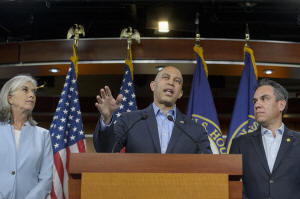Democrats clashed over their shutdown strategy. But the party's identity
crisis runs far deeper
[March 20, 2025]
By MATT BROWN
WASHINGTON (AP) — Democrats have been sniping at each other in public
since Senate Minority Leader Chuck Schumer helped pass a Republican
spending bill that prevented a government shutdown. But the divisions in
their party hardly began there.
For months, Democrats have been struggling to coalesce behind a
political strategy as they confront President Donald Trump and the
Republican majorities in the House and the Senate. Behind closed doors
at party retreats, think tank meetings and strategy sessions, Democrats
have been having tense and searching conversations about ideology,
policy and messaging as they urgently try to address what went wrong in
last year's election.
“I think we’re in a place internally where we’re having these family
discussions and figuring out what the path forward is,” said Rep.
Maxwell Frost, a Florida Democrat and, at age 28, the youngest member of
Congress.
Democrats grapple with the scale of their challenges
The Democratic Party's political woes were front and center last week as
House Democrats gathered a short drive away from Washington for their
annual political retreat.
Frost said Democrats were alarmed by exit polls from November's
presidential election, which found Trump won voters without a college
degree and those who made less than $100,000 in annual income. The same
data showed Trump also made inroads with communities of color and young
voters, traditionally areas of strength for Democrats.

Recent polls underscore the challenge.
Democrats are facing stark dissatisfaction among Americans, including
among the party’s base. Only about 3 in 10 U.S. adults had a favorable
view of the Democratic Party, versus 54% who held an unfavorable view in
a March CNN poll. And about 6 in 10 Democrats said they preferred to see
the party work to stop the Republican agenda, compared with about 4 in
10 who preferred Democrats work with Republicans. That represents a
stark shift from the outset of Trump’s first term in 2017, when about
three-quarters of Democrats said they preferred working with Republicans
over stopping the GOP agenda.
“The Democratic brand absolutely needs to change," said Rep. Seth
Moulton, a Massachusetts Democrat. "We will not win with the status
quo.”
Moulton said that Democrats must “be very public about” their reckoning.
“I think we need a high-level message from leadership that, ‘Hey, we got
the message of the last election. We heard you voters. You voted us out
across the board, and we’re going to change,’” Moulton said.
Democrats agree on some points. They uniformly detest Trump, broadly
believe that they have failed to connect with the working-class voters
they aim to champion and generally agree on the direction that economic
and social policies should trend.
But party leaders are far from united about how to best confront Trump
in his second term and about what policies should be emphasized to
voters as they do it.
The 2024 election offered little clarity in the progressive vs.
moderate debate
Part of the difficulty is that both the Democratic Party’s progressive
and moderate wings feel as though the early days of the Trump
administration have vindicated at times their differing approaches.
“We are locked out of accessing the levers and buttons of power, of
reaching government. Our next milestone, and it is a critical milestone
to achieve, is winning the majority in 2026 that is of paramount
importance,” said Rep. Brad Schneider of Illinois, chair of the New
Democrat Coalition, a bloc of House Democrats that advocates for
“pragmatic, effective policies."
For Schneider, all of the party's efforts should be focused on winning
back the majority, rather than winning the day's news cycle.

[to top of second column]
|

House Minority Leader Hakeem Jeffries, D-N.Y., center, is joined by
House Minority Whip Katherine Clark, D-Mass., left, and House
Democratic Caucus Chair Pete Aguilar, D-Calif., right, during a news
conference at the Capitol, Friday, March 14, 2025, in Washington.
(AP Photo/Rod Lamkey, Jr.)

“I’ve said this to my colleagues, and I’ll keep repeating it: We can
win moments (that) go viral. We can win arguments here and there. We
can even win a day. But if what we’re doing isn’t putting us on the
path to win the election next year, we haven’t gotten to where we
need to be, and we’re not doing what we need to do," Schneider said.
More progressive lawmakers make a different case.
“So I think that this is a real opportunity for the Democratic Party
to transform — the way we need it to — to be a party of working
people,” said Rep. Greg Casar of Texas, chair of the Congressional
Progressive Caucus.
“I think that we should stop looking at this so much as a left-right
fight within our caucus — so many voters don’t even think about it
that way — and think of it more as a bottom-up fight where we can
unite the vast majority of the country against the small number of
people that are screwing them over in their government and their
workplaces," Casar said.
Democrats are already looking ahead to next year's midterm
elections
With Republicans controlling the House by only a handful of seats,
Democrats say they are in a strong position to retake the majority —
and they aren't waiting until 2026 to get their campaigns off the
ground. The pace, intensity and unpredictability of Trump's
governance have alarmed, frightened and excited voters across the
country. In Trump's blitz, Democrats see an opportunity for
pushback.
This week, with the House on recess, the Democratic National
Committee launched a “People's Town Hall” series of national events
meant to connect with voters in swing states and districts. The
effort follows weeks of town halls hosted by national liberal
figures, including Sen. Bernie Sanders of Vermont and Gov. Tim Walz
of Minnesota.
The Congressional Black Caucus, meanwhile, plans next month to
launch a bus tour of lawmakers to Black communities in congressional
districts across the country in a bid to engage voters disenchanted
with the party and highlight potentially unpopular decisions by
Trump.

And members of Congress have supported the efforts of aligned legal
groups like Democracy Forward, which has spearheaded the legal
pushback to Trump's agenda in the judicial system, while liberal
organizing groups like Indivisible are coordinating nationwide
protests throughout April against the Trump administration.
Rep. Suzan DelBene of Washington, chair of the House Democrats’
campaign arm, said House Democrats will focus on “kitchen table
issues” in making their pitch to voters. She singled out lowering
costs and public safety as key topics.
“That’s why we outperformed the top of the ticket pretty much across
the country," DelBene said, referring to last year's election
results. "So we’ll continue to do that.”
But even as Democrats try to hone their message, some Democrats are
stressing the urgency of taking a stand against Trump now, long
before votes are cast next November. Rep. Ayanna Pressley, a
progressive from Massachusetts, said the party must respond first to
“this unprecedented power grab” and “lawless actions” from the Trump
administration before debating whether to drop parts of its agenda.
“Who are we? The midterms are around the corner," Pressley said,
“and our most compelling argument will not just be what we stopped
but what it is that we seek to advance.”
“What I will say is that I think now is not the time to be
moderating our aspirations,” she said.
All contents © copyright 2025 Associated Press. All rights reserved |